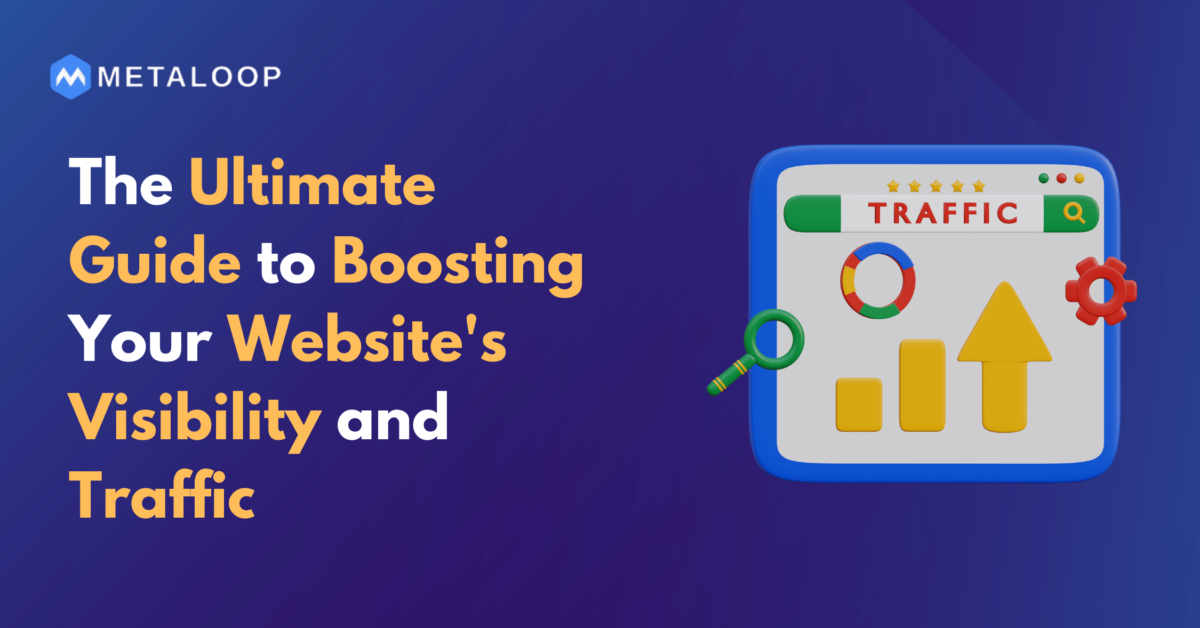8 Ways to Increase Website Traffic Like a Pro
The more visitors to your website, the more likely you are to make a sale, find a new client, or gain a reader for your blog. Simply put, increasing website traffic is essential to achieving your goals. Therefore, it’s critical to comprehend search engine optimisation (SEO). You have more control over how many people visit your website, where it appears on search engine results pages (SERPs), and how people find you online. However, it is now more difficult than ever to optimise a website for search engine indexing and performance.
In this blog, we’ll discuss how to increase traffic to your website and optimise it for search engines.
Publish high-quality, relevant, and authoritative topical content
One of the best ways to optimize your website for search engines is to publish high-quality, topical content. This means writing articles and blog posts that are relevant to your business and about topics that are keyword rich. The authority and relevancy of your website are enhanced by increased site traffic since it attracts more users who are exactly your target market. Not only will this help your website rank higher in search engine results, but it will also show potential customers that your brand is an authoritative source of information that can be trusted. By publishing informative, engaging content, you can draw potential customers to your website and Increase website traffic also earn their trust. Aim to post at least one new blog post per week.
Update your content regularly to increase traffic
One of the best ways to gauge how relevant a website is by regularly updating its content. Audit the content and update it as required.
Blog posts can even be shorter updates regarding the specific topics you are targeting. Link to relevant CMS web pages and blog posts when doing so will help the reader understand the subject matter better or provide them with more details.
Optimize your metadata
When designing your website, each page has a blank space between the tags where you can add metadata or details about the information on the page. They will have pre-populated this data for you if your CMS site was created by the UMC web team. However, as your site changes over time, you must review and update the metadata. Meta tags are parts of HTML code in the header of a webpage. They are crucial for SEO since they aid search engines in comprehending the content of the page. The page title and meta description tags should receive the most attention because they are (typically) displayed whenever a webpage appears in the SERPs.
Increase traffic Using internal links and high-quality backlinks
It is most probable that a website will receive links from other websites, which will improve your search engine optimisation, if it is authoritative, unbiased, and helps visitors learn more about what they are interested in. Internal linking can increase the efficiency with which search engines index your website and the rate at which they index newly uploaded information. Internal links also help search engines understand the hierarchy of your website’s pages and reinforce its organisational structure. While acquiring high-quality backlinks can be somewhat more difficult. This is because you will need to acquire other websites to connect to your website.
Improve your authority and trustworthiness by adding relevant links within the text. Instead of having “click here” links, attempt to write the name of the location. Always use descriptive links by linking keywords—it not only improves search engine optimization but also provides value to your readers, particularly those with impairments or who are using screen readers.
Do keyword research
You can utilise keyword research to find the most pertinent terms that consumers use while looking for topics relating to your goods or services. You can incorporate keywords into the copy and content of your website to encourage search engines to show users your web pages. The link between keywords and website optimisation is pretty simple. Google (and other search engines) will send their bots to visit your website, scan and index your content, score the significance of your keywords, and then rank your page in the SERPs appropriately. You can use various tools to find which keywords are most relevant to your company. Once you have identified a list of target keywords, you can then start to insert them into your website content, including titles, headings, URLs, links, etc.
Improve website speed and performance
Website speed and performance are modest but crucial variables in website optimization. A website that loads swiftly and works smoothly is more likely to keep visitors interested and urge them to come back. Conversely, if a website loads slowly, potential clients will probably leave in frustration.
Improving website speed and performance is crucial for any business that wants to flourish online since poor website speed may also have a detrimental influence on search engine rankings, making it more difficult for potential consumers to locate the site in the first place.
There are several ways to improve website speed, including compressing images, reducing bloat in your code, using a caching policy, using a CDN (Content Delivery Network), using fast hosting, etc. Businesses can make sure their site has what it takes to maximise organic traffic. And convert visitors into sales by taking efforts to enhance website speed and performance.
Create new content
Creating new content is essential to build a loyal base of customers. Remember, other competitive websites are offering similar products. You need to stand out and be perceived as a thought leader in your industry.
Consistently update the content on your website. Make it interesting and engaging for your followers to build loyalty.
Additionally, websites that post fresh, high-quality material are frequently rewarded by Google and other search engines. It is excellent practise to consistently update the content of your website if you want to rank well in the SERPs. Ensure that the content contains targeted keywords. Don’t go overboard, though; just write naturally.
Improve website design
Websites that provide a positive user experience (UX) are given priority by search engines. Websites that have faster page speeds, are mobile and tablet-friendly, prioritise readability in their design. And have easy site navigation are likely to rank better than other websites.
Search engine optimization is all about your visitors. Your website should be user-friendly and customer-centric. The above tips are a good guide on how to optimise your website for search engines, attract more visitors, and improve traffic to your website. Metaloop is a full-service digital marketing agency based in Surat. Get in touch.



Write a Comment